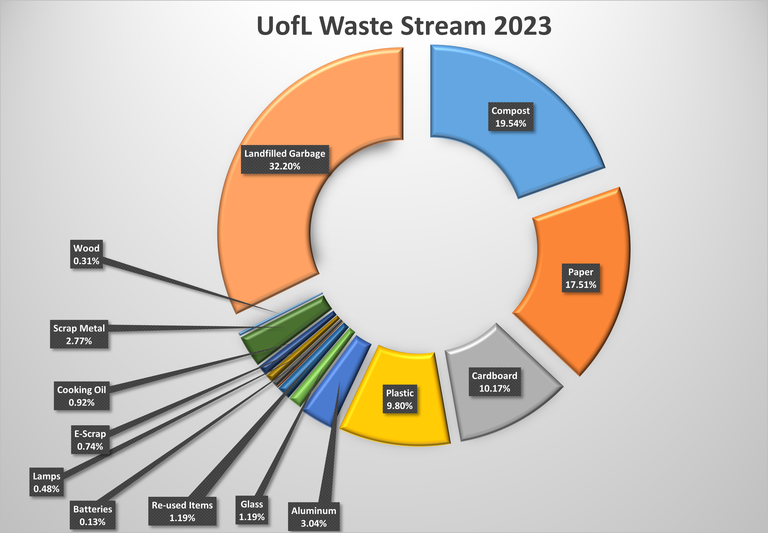Zero Waste
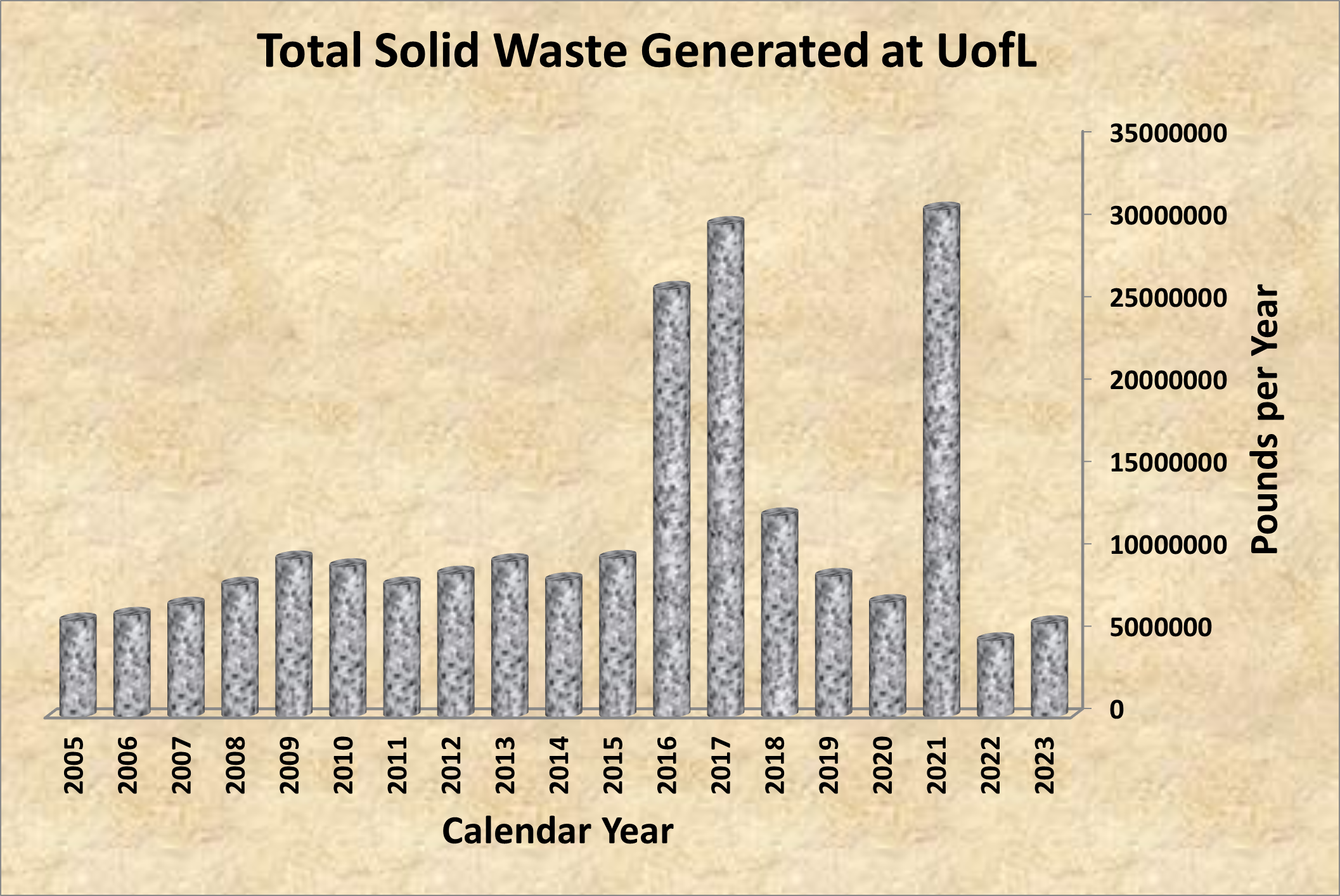
The University of Louisville has been taking a variety of steps to reduce the amount of waste generated on campus and to divert a greater percentage of our waste from going to landfills. Finding ways to minimize waste is hugely beneficial to our bottom line and to our climate impact, as every ton of our waste is hauled in diesel trucks over 35 miles from campus to the Valley View Landfill in Trimble County, KY at a cost of over $66/ton. Imagine how much money and pollution we could save by moving away from the disposable mindset!
All told, in 2023, our university generated nearly 500,000 pounds of waste each month! That represented 15.8 pounds of waste each month for every student, faculty, and staff member at UofL. (See our full 2023 Recycling Report.)
Explore our full 2023 Recycling Report
Transition to shared services stacks up savings in both time & paper
(UofL News, Sept. 12, 2016)
We can do better! It is imperative that we step up our efforts to reduce the amount of solid waste produced on campus, and we can see the need to tackle this problem through a multifaceted, university-wide approach, as outlined in our 2021 Strategic Vision for Institutional Zero Waste. There is still much more we need to do in order to achieve our goal of Zero Waste.
In 2023, we recycled/composted/reused nearly 4.3 million pounds (75%) of our waste. Our landfill diversion rate in 2023 increased 7% from 2022!
Recycling is a key principle, but true sustainability demands that it must always come AFTER efforts to significantly reduce waste generation in the first place and to reuse items whenever possible. UofL's Zero Waste programs include extensive recycling, reuse, composting, waste minimization, and other waste reduction efforts from the classroom to the construction site.
It's important to note that construction and demolition projects have a huge impact on both our total waste generation and our landfill diversion rates in any given year. 2021 rates were significantly higher due to major campus demolition and renovation projects with the replacement of Miller and Threlkeld Halls with Belknap Village North and South. 2016-17 rates were significantly higher due to many campus construction projects, including the demolition of Crawford Gym and the Student Services Annex which together generated nearly 17,000,000 pounds of demolition waste which was recycled in 2016. The primary cause for the 2011 drop in landfill diversion was an unusually high percentage of construction debris in our waste stream that could not be recycled at the time. Our landfill diversion rate without construction/demolition waste was: 74.3% in 2023, 66.9% in 2022, 42.9% in 2021, 55.2% in 2020, 43.0% in 2019, 43.7% in 2018, 42.9% in 2017, and 39.3% in 2016.
Starting as far back at 2008, UofL students in GRASS (Group Recycling And Sustainable Solutions) helped change the disposable culture on campus through awareness raising campaigns such as "dumpster dives." They also organized to open the UofL Free Store in 2013. Since those early days, new student groups, interns, and leaders have carried the Zero Waste torch.
Zero Waste Planning
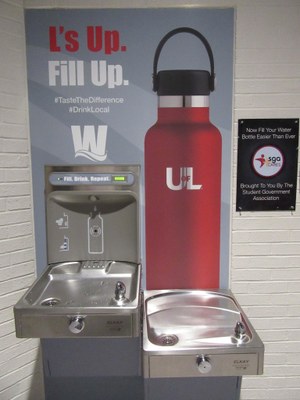 Following a year of research and discernment, on December 14, 2024, the UofL Sustainability Council was proud to submit a proposed Bottled Water Phase Out Plan for the University of Louisville. This plan, designed to minimize the following negative environmental, social, and fiscal impacts of widespread bottled water usage, was requested by UofL President Kim Schatzel at a meeting held with the Council Chair and the Assistant to the Provost for Sustainability Initiatives on November 30, 2023. In response to President Schatzel's request, the Sustainability Council assembled a diverse workgroup of students, faculty, and staff from across the university to meet regularly and discuss challenges, opportunities, and strategies with respect to the culture of bottled water usage across our campuses. Representatives from the Louisville Water Company and the Post-Landfill Action Network (PLAN) were brought in to consult on this work, examples from other schools were researched, and a university-wide audit of filling stations was conducted. The proposed plan is the result of that year-long collaborative process.
Following a year of research and discernment, on December 14, 2024, the UofL Sustainability Council was proud to submit a proposed Bottled Water Phase Out Plan for the University of Louisville. This plan, designed to minimize the following negative environmental, social, and fiscal impacts of widespread bottled water usage, was requested by UofL President Kim Schatzel at a meeting held with the Council Chair and the Assistant to the Provost for Sustainability Initiatives on November 30, 2023. In response to President Schatzel's request, the Sustainability Council assembled a diverse workgroup of students, faculty, and staff from across the university to meet regularly and discuss challenges, opportunities, and strategies with respect to the culture of bottled water usage across our campuses. Representatives from the Louisville Water Company and the Post-Landfill Action Network (PLAN) were brought in to consult on this work, examples from other schools were researched, and a university-wide audit of filling stations was conducted. The proposed plan is the result of that year-long collaborative process.
Our vision is to create a campus culture and environment where the default behavior is no longer consuming bottled water, but refilling containers with award-winning Louisville Tap. We seek a university where bottled water is no longer widely available, but instead everyone has easy access to local tap water.
 Throughout 2020-21, UofL contracted with the student-led Post-Landfill Action Network (PLAN) to conduct a zero waste assessment and visioning process with a wide variety of stakeholders across the university. The process involved both PLAN staff and UofL Zero Waste Interns conducting data gathering, compiling reports, and facilitating forums, interviews, and conversations.
Throughout 2020-21, UofL contracted with the student-led Post-Landfill Action Network (PLAN) to conduct a zero waste assessment and visioning process with a wide variety of stakeholders across the university. The process involved both PLAN staff and UofL Zero Waste Interns conducting data gathering, compiling reports, and facilitating forums, interviews, and conversations.
In October 2021, PLAN ranked UofL #7 in their first annual list of Top 10 Zero Waste Campuses in the U.S.
![]() In spring 2021, we released UofL's Strategic Vision for Institutional Zero Waste. This vision is the foundation for developing a comprehensive Zero Waste Plan and it is built on the findings of the zero waste assessment.
In spring 2021, we released UofL's Strategic Vision for Institutional Zero Waste. This vision is the foundation for developing a comprehensive Zero Waste Plan and it is built on the findings of the zero waste assessment.
In November 2020, after conducting a comprehensive Zero Waste Atlas Assessment designed to help campuses assess and streamline campus systems for materials management, the Post-Landfill Action Network (PLAN) gave UofL an overall Zero Waste score of 58.2% (864.5 out of a total possible 1600.5 points).
This compares very favorably to the other campuses PLAN works with, which average between 40-50%.
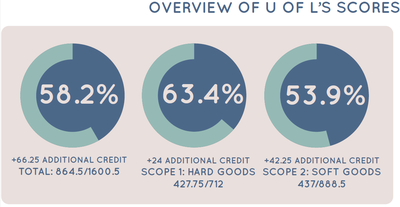 For Scope 1 surplus property and hard-to-recycle materials, UofL scored a 63.4% (427.75 + 24 additional credits out of a total possible 712 points).
For Scope 1 surplus property and hard-to-recycle materials, UofL scored a 63.4% (427.75 + 24 additional credits out of a total possible 712 points).
For Scope 2 food waste and single-use materials, UofL scored a 53.9% (437 +42.25 additional credits out of a total possible 888.5 points).
This assessment was conducted with the help of UofL's Zero Waste interns and laid the groundwork for the development of UofL's first Zero Waste Plan, which the Sustainability Council will begin to work on in 2021.
Read the full PLAN Atlas Stage 1 Report here.
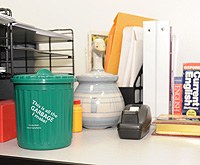
The mini-bin is a reminder that we can recycle most everything at UofL!
In Spring 2020, the Sustainability Council hired PLAN to support two UofL Zero Waste interns - Lily Stewart ‘22 and Jacob Foushee ‘22 - to conduct a holistic assessment of the University’s waste management system. UofL has expressed commitment to not only increasing their waste diversion rate, but also changing the ways the campus purchases and manages goods to be in the best interests of the environment and the University. The final report is intended to identify concrete steps that UofL can take to shift towards a zero waste system and continue to uphold its reputation as a leader among sustainably-minded universities.
The interns used PLAN’s Zero Waste Atlas Assessment - a project designed to help campuses assess and streamline campus systems for materials management - to collect the information used to inform this report. This report offers a snapshot of existing programs, services and infrastructure, illustrates ideal material flows throughout a campus, and proposes recommendations to fill the gaps identified during the assessment. While this Atlas Assessment provides numerous suggestions based on its assessment of the capacity of existing campus systems and best practices from other campuses, campus stakeholders must ultimately decide on the exact path the University takes to achieve zero waste.
Zero Waste Committee
In 2013, the Sustainability Council convened a new committee to take our existing programs to the next level. Phase I of our “Mini Bin” Garbage Reduction and Single Stream Recycling program are in place and the program has been the major factor in increasing recycling rates across the University, particularly in the areas of cardboard, paper, aluminum, glass and plastic. While the numbers have increased every year since the program’s inception in 2009, there are areas that need to be improved, including:
- Promotion of recycling programs - increasing awareness, understanding of program, individual prompts to increase recycling
- Changing University-wide culture to normalize recycling through behavioral change and institutional change
- Improving current methods and discovering new opportunities to reuse items University-wide
- Developing university-wide goals and systems to measure progress and provide feedback to the University community
- Custodial staff training, development of policies regarding waste disposal, performance review standards, etc.
- Identification of specific waste streams that can be minimized or eliminated, including modifications in purchasing habits
- Recycling at special events, including sports venues, conferences, catering, other large events
- Expanding pre- and post-consumer food waste composting
UofL's Zero Waste Committee is attempting to address these concerns and we'd love to have your input. This voluntary committee will report to the Sustainable Operations Committee. To get involved, contact: Greg Schetler at (502) 852-0926.
Remember that the famous “Three Rs” are in order of priority: Reduce, Reuse…THEN Recycle! Learn why at The Story of Stuff.
Reduce...
- 42 Ways to Not Make Trash
-
Go Paperless! Instead of printing, use electronic file-sharing like SharePoint or Blackboard.
- Instructors: Get the mobile app for paperless exams! - If you must print, use both sides! All UofL Uniprint Stations now automatically print double-sided, according to our Copiers and Printing Policy! This switch alone reduced our paper consumption by about 30,000 pages per month!
- Keep your mistakes and second-thoughts digital! The Canon printers installed across campus in the fall of 2018 feature misprint-reduction technology. The “Print Anywhere” feature allows you to send a print job from your office or your mobile device, and pick it up at any Canon device on campus. Your print jobs wait in your personal, secure print queue for 24 hours, and they only print out when you tell them to. This reduces paper waste caused by unintended or premature print jobs.
- Bring reusable shopping bags instead of accepting new paper or plastic bags.
- At mealtimes, use reusable items like mugs, cups, utensils, cloth napkins and towels rather than disposable products. If you're headed out, bring your own!
- Reusable Mug/Cup Program: Receive 10 cents off your next drink whenever you bring your own reusable mug or cup to the SAC Marketplace, Zoca in Louisville Hall, Lueberry in the SRC, or any P.O.D. location on campus! At our Starbucks locations, you'll not only get a 10-cent discount, but 25 bonus "stars" when you bring in a reusable Starbucks cup!
- Reusable To-Go Containers: In Fall 2023, UofL Dining brought back the reusable to-go option that was first piloted on campus in 2015-16 and 2018-19. For $5, anyone can buy into the program and they will receive a reusable OZZI to-go clam-shell container which they may use at The Ville Grill. Students who are part of the All-Access Plus dining plan get the service free. Patrons will simply return their container to The Ville Grill for washing and pick up a new one. Memberships in the program are available at The Ville Grill registers.
- Use reusable filters instead of disposable ones in your furnace, coffeemaker, etc.
- Use rechargeable batteries rather than disposables.
- Avoid unnecessary purchases and excess packaging. Buy in bulk.
- Save some money and the planet by first seeking used and pre-owned items before shopping for new. UofL departments can freely exchange durable items like furniture and equipment for reuse through UofL Surplus.
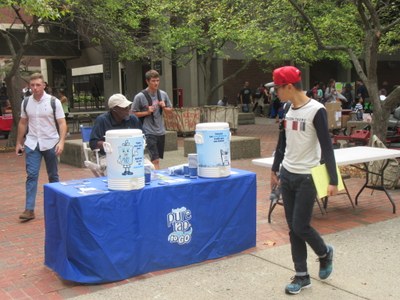 UofL Sustainability Council proposes Bottled Water Phase Out Plan (UofL Sustainability News, Dec. 16, 2024)
UofL Sustainability Council proposes Bottled Water Phase Out Plan (UofL Sustainability News, Dec. 16, 2024)
UofL’s partnership with Louisville Water Company is ‘very definition of a win-win’ (UofL News, Aug. 22, 2018)
Get Back to the TAP this Fall! (UofL Sustainability Blog, Aug. 1, 2018)
Sustainability on Tap! (UofL Sustainability Blog, Aug. 8, 2017)
Bottled Water expected to Outsell Soft Drinks in the U.S this year (UofL Sustainability Blog, Oct. 26, 2016)
Back to the Tap! (UofL Today, Jan. 14, 2015)
UofL & Louisville Water Co. promote tap water (Courier-Journal, Jan. 14, 2015)
Sustainability on Tap
UofL and Louisville Water Company are working together to educate students, faculty and staff on the value of getting back to the tap on campus. This partnership includes messaging at drinking water fountains, events and guest lectures. Louisville Water's story of science, engineering and public health brings a real-world example to the classroom. Louisville Water Co. will provide staff for guest lectures and tours of the water treatment facilities. Curious about how drinking water is made or the engineering behind it? Perhaps you'd like to explore the political and global issues around water or dive into the marketing of tap water.
Contact Kelley Dearing Smith, Louisville Water to arrange a tour or guest lecture: ksmith@lwcky.com or 502-569-3695
- Drink Louisville's award-winning tap water instead of bottled water. It's easy to fill up your bottle with delicious, chilled Louisville Tap at one of our many filling stations around campus, including:
Belknap Campus: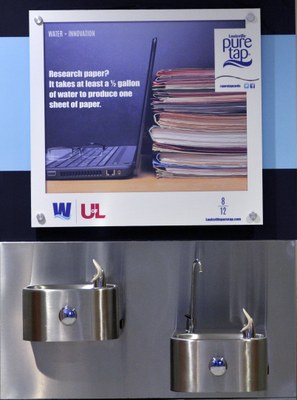 Belknap Academic Building (BAB) - all floors
Belknap Academic Building (BAB) - all floors
Belknap Villages North & South - all floors
Bettie Johnson Hall - lobby
College of Business - all floors
College of Education - 1st floor Lobby and near Dean’s office
Community Park - lobby
Davidson Hall - 1st floor
Ernst Hall - 1st floor
Ekstrom Library - 1st & 2nd floors
Ford Hall - 1st & 3rd floors
Get Healthy Now Employee Wellness Center
Gottschalk Hall - 1st floor
Humanities - 1st floor
J. B. Speed - 1st floor at elevator
Kurz Hall - lobby
Law School - 1st floor & 2nd floor east and west
Life Sciences - 3rd floor
Louisville Hall - lobby
Lutz Hall - 1st & 3rd floors
Lynn Soccer Stadium
Music Library
Natural Sciences - 1st floor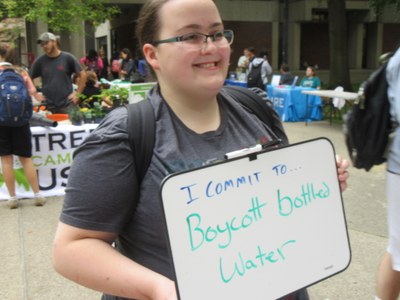 Service Complex - 1st floor
Service Complex - 1st floor
Strickler Hall - 1st & 4th floors
Student Activities Center - all floors
Student Rec Center - all floors
Unitas Hall - lobby
University Tower Apts - lobby
Urban & Public Affairs - 1st and 2nd floors
W.S. Speed - 1st floor
Health Sciences Center:
Abell Administration Center (59c) 1st & 5th floors
Kornhauser / HSC Commons (55d) 1st & 2nd floors
K Building 2nd floor
Dental School (55c) - basement (room 0107),1st floor north by freight elevator & south by room 115, 2nd floor by freight elevator
Instructional Building (55b) basement, 1st & 2nd floors
K-Wing (59b) 1st floor (patient waiting room), 2nd floor by restrooms
Medical-Dental Research Building (51) 1st floor
School of Medicine Research Tower (55a) 1st floor student lounge, 2nd floor
School of Public Health & Information Sciences (59p) 1st floor
UofL Sustainability Council proposes Bottled Water Phase Out Plan (UofL Sustainability News, Dec. 16, 2024)
In order to discourage the use of disposable bottled water on campus (to reduce expenses, solid waste generation, and the emissions and environmental impact of packaging and shipping water), and to comply with our sustainability goals and LEED requirements, University Planning, Design & Construction has established a policy to install chilled water bottle filling stations in all of our new construction and major renovations. Two recent examples of this policy include:
1. BAB: Belknap Academic Classroom Building - Featuring 16 chilled water bottle filling stations, each with two drinking fountains adjacent; and
2. SAC Renovation / Expansion - The project is adding 6 chilled water bottle filling stations, each with two drinking fountains adjacent.
New ‘green’ efforts would place fee on disposable plastic bottles (The Louisville Cardinal, Jan. 30, 2013)
"Having conducted about 200 Tap Water Challenges on campus, I have found that about 88% of students prefer the taste of Louisville Tap to Aquafina (which is simply tap water from Indiana) or Kroger bottled water (tap water from Virginia)!"
- Bess McLaughlin, UofL Senior, Spring 2011
- Chemical Waste Minimization - Before you purchase a chemical for your lab, check UofL's CHEMEX inventory. You could save yourself money, while doing your part to reduce waste and avoid costly disposal.
- Unwanted Mail Reduction
Reuse...
IFIXIT - Don't trash it, FIX IT! The free repair guide for everything, written by everyone.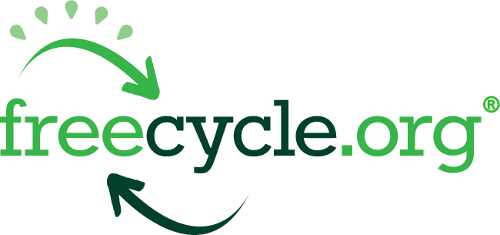
Got something to get rid of? Need something?Post it on Freecycle!
DonorsResource.org - Don't trash it, donate it! Find a local nonprofit that needs the items you want to donate. Members of the UofL community are encouraged to seek creative ways to see that durable items are reused. This helps save money, reduces the amount of waste we send to the landfill, and reduces the environmental impact of producing and transporting new goods.
From hospital trash to upcycled treasure (UofL Hospital News, March 28, 2019)
- Got Extra Food? If you've got leftover food from any campus events, please post it using the Share Meals app. Individuals in need and volunteers from the UofL chapter of the Food Recovery Network, will collect it and deliver it to local charities or the Cardinal Cupboard campus food pantry in the SAC.
- UofL's surplus property exchange program allows staff and faculty to swap reusable departmental items such as furniture, equipment, electronics, and supplies. Surplus items no longer needed by the University may be donated to another state/governmental agency or non-religious non-profit organization. Unclaimed Surplus items are ultimately auctioned to the public. Surplus does not accept small/low-value items like office supplies, but you can donate them to the UofL Free Store or local non-profits like the Louisville Story Program! UofL also donates unwanted building materials, furniture, and appliances to Louisville's Habitat for Humanity ReStores where they can get a new life while raising funds for affordable housing projects.
- Chemical Exchange: In our labs, an up-to-date chemical inventory can help avoid duplicate purchases. Chemical purchases can also be reduced by borrowing and sharing chemicals between laboratories. Departments are encouraged to exchange chemicals and lab personnel can also utilize the Chemical Exchange Program (CHEMEX) offered by UofL's Dept. of Environmental Health & Safety (DEHS). Chemicals that are unopened or partially used are eligible for CHEMEX. Opened chemical containers must be certified as uncontaminated not expired by the offering lab. Read more: Green Scene: DEHS Chemical Exchange Program
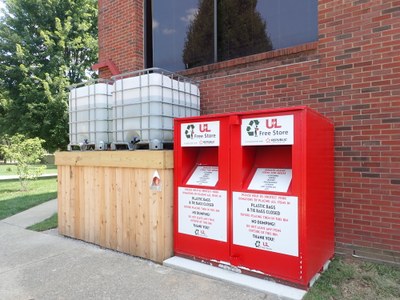
Sustainability at UofL: GRASS develops Free Store (The Louisville Cardinal, 4/3/13)
-
Free Store: Located in Honors House 108, the UofL Free Store is run by interns and volunteers who help process donations and keep the store tidy and organized in support of the project to help keep useful items out of the landfill while meeting the needs of their peers. The Free Store is a space for the on-going free exchange of clean, functional, durable items like clothing, shoes, bedding, electronics, small appliances, household items, bath & beauty supplies, books, school & art supplies, and more. In 2023-24, the Free Store diverted 5,012 pounds of items from the landfill! Donations can be made any time in the red bins at the Garden Commons next to the Baptist Center. The store is open to all UofL students and employees set hours each week during the regular academic year. Volunteers wanted! Follow the Free Store on
 or
or  .
.
- In April 2016, UofL solidified an on-going partnership with Goodwill Industries of Kentucky to capture even more items for reuse. Permanent Goodwill collection bins are now available in the lobbies of all nine Belknap Campus Housing locations: Bettie Johnson Hall, Community Park, Kurz Hall, Louisville Hall,
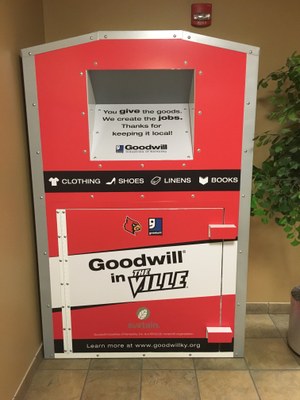 Medical-Dental Apartments,Miller Hall, Unitas Tower & University Tower Apartments. Please use these bins at your convenience to donate any of the following items and help us keep more stuff out of the landfill:
Medical-Dental Apartments,Miller Hall, Unitas Tower & University Tower Apartments. Please use these bins at your convenience to donate any of the following items and help us keep more stuff out of the landfill:
• Clothing
• Other textiles (towels, linens, curtains, pillows)
• Books, music, media (VHS tapes, DVDs, CDs, computer/gaming software)
• Shoes
• Accessories (purses, backpacks, belts, neck ties, hats)
• Décor
• Kitchenware
Goodwill CANNOT accept any of the following items: Glass, Paint, Chemicals, Car batteries, Tires, Computers or computer components, or Televisions.
Each year, during Spring Move-Out, special "Lighten Your Load" collection bins are setup in the lobby of each residence hall and students donate thousands of pounds of items to Goodwill to keep useful items out of the landfill! The impact is astounding:
2021: 2,418 pounds of reusable goods to Goodwill!
2020: 1,549 pounds
2019: 7,286 pounds
2018: 4,751 pounds
2017: 5,737 pounds
2016: 5,331 pounds
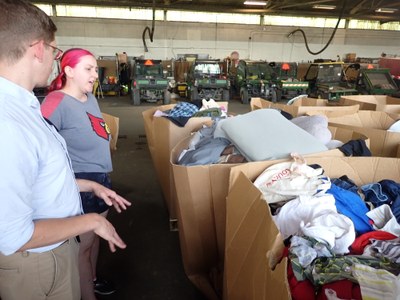
UofL hosts Zero Waste Tour for University of Kentucky staff (UofL Sustainability News, June 21, 2024)
UofL's Zero Waste partnership with Goodwill Industries (WAVE 3 Listens Live, April 23, 2108)
‘Lighten Your Load’ initiative helps UofL students move out of dorms sustainably (WHAS-11, April 25, 2014)
- During Move-Out Time, UofL residents are also encouraged to donate and exchange reusable items through the "Trash-to-Treasure" program in collaboration between the UofL Free Store and University Housing. Items are collected in temporary bins in the lobbies of all residence halls during April, then they are sorted and stored over the summer for redistribution back to students at Move-In Free Sales during Welcome Week. In 2023 alone, this initiative repurposed over 2,000 pounds of useful items! Look for signs and collection bins in residence hall lobbies as you think about moving out!
Previous versions of this program from 2012-2022 were organized in partnership with Goodwill Industries of Kentucky as "Lighten Your Load" (formerly "Give and Go") collections and an associated Free Stuff Swap hosted at the end of the year by University Housing . At its pre-pandemic peak in 2019, during the Lighten Your Load Move-Out Waste Reduction campaign, students donated 7,286 pounds of reusable goods to Goodwill! - Prior to the opening of the UofL Free Store, roughly 2000 pounds/year of used clothes and shoes were collected from 2012-14 in light green bins set up by a non-profit organization at Miller Hall, Threlkeld Hall, Kurz Hall, Unitas Hall, and University Tower Apartments. The Gaia Movement is a non-profit organization which uses revenue from used clothing to support and on‐going environmental and community development projects around the world. Clothes collected at UofL helped fund efforts including a solar power project in Quissanga District in Mozambique; a biogas project in Capo Delgado Province, Mozambique; a solar power project in Changalane District, Mozambique; and the Seeds for Life project in India.
- Clean Styrofoam coolers used in shipping can be reused! For on-campus reuse, contact Cathy Price (Dept. of Environmental Health & Safety) at 502-852-2956. Also, the local non-profit Supplies Overseas can use such coolers (and other things like saline bags) for shipping medical supplies to needy communities. They welcome both one-time and regular donations of surplus medical supplies and equipment from all individuals, hospitals, medical clinics, and other health care organizations throughout the region. They accept drop-offs at their warehouse (1500 Arlington Ave.) 8am-4pm, Monday-Friday. 502-736-6360.
 Surplus medical equipment from UofL gets a second life in Ghana (UofL News, Feb. 6, 2017)
Surplus medical equipment from UofL gets a second life in Ghana (UofL News, Feb. 6, 2017)
...THEN Recycle!
- From cans to magazines to batteries to computers...learn about the wide array of items that can be recycled at UofL here.
Compost = Recycling of Organic Wastes!
- UofL is turning organic wastes into valuable fertilizer both on-site and off-campus! Learn how. Help us out and get your hands dirty with UofL's Composting Project!
-
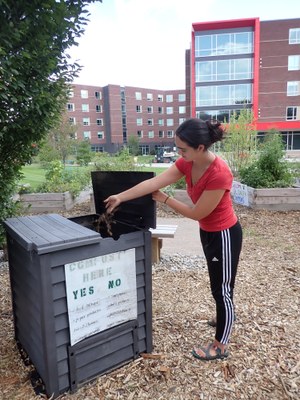 You can compost your own food scraps on campus in outdoor compost bins at the:
You can compost your own food scraps on campus in outdoor compost bins at the:- UofL Community Composting Project site at the north end of UofL's Grounds Lot at 240 E. Bloom St. just one block north of Cardinal Blvd. between Brook and Floyd Streets (map here).
- Garden Commons (northeast of Baptist Campus Ministry)
- Urban & Public Affairs garden at 426 W. Bloom St. (behind Bettie Johnson Hall).
- UofL's LEED Gold certified Center for Predictive Medicine on the Shelby campus features a "Birthday" Garden with a compost bin.
-
Special indoor collection bins for plant-based materials picked-up for composting are available at:
- Clinical & Translational Research Building at HSC (all 10 break rooms)
- Humanities 313 (Philosophy Department)
- Strickler 310 (Communication Department)
- Urban & Public Affairs 112 (1st floor kitchen)
* If you'd like a compost bucket for your department and have a volunteer to set it out weekly, we're happy to come pick it up for you! Just contact Brian Barnes at 502-338-1338.
- No meat, bones, or dairy products are accepted in any of these on-site composting bins. This helps reduce problems with odors and vermin.
- Please contribute any plant-based wastes such as food scraps, paper towels, paper plates/cups/sleeves, napkins, tissues, newspaper, cardboard/pizza boxes (please tear up large pieces), coffee grounds, tea bags, fruit peels, vegetable scraps, bread & baked goods, leaves, etc.
- Start a compost collection in your building! All it takes is a dedicated volunteer willing to bring a bin out to the curb on a Friday afternoon and back into the building on Monday morning. The UofL Community Composting Project will come by over the weekend to collect your organics. To start the wheels turning, contact the Project Director, Brian Barnes, 502-338-1338.
- Get a compost pick-up at your home, business, office, church, or anywhere in town! If you cannot compost on-site, you can contract for weekly pickup at a low monthly rate through the Louisville Compost Co-op that works in partnership with UofL's Community Composting Project.
- UofL has been turning about 500,000 pounds of campus grounds waste into valuable compost and mulch on site for many years. UofL's research facilities also generate over 300 tons/year of waste animal bedding. This used to be sent to the landfill, but in February 2012, UofL began sending this waste stream to off-site composting facilities, where it is turned into an environmentally-responsible soil amendment.
- In July 2010, UofL volunteers began on-site composting of pre-consumer plant-based food waste from our dining facility kitchens. This effort continues to capture various waste streams, but in March 2012, UofL established a contract for collection and twice-weekly pick-up of all food wastes from UofL dining facilities as well as our Early Learning Campus. This allows us to compost both pre- and post-consumer food wastes, meats, bones, and dairy-products, now totaling over 400,000 pounds/year. This contract is managed by WestRock Recycling.
-
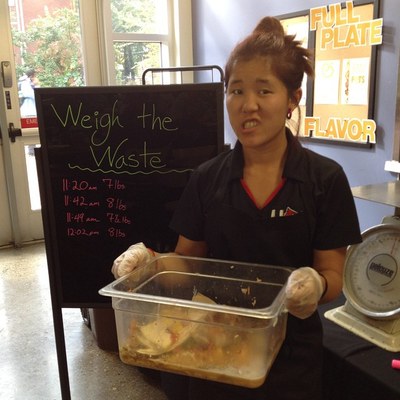 UofL Dining hosts an on-going Weigh The Waste campaign to raise awareness during the fall UofL Sustainability Week. Food scraps are collected from patron's plates during a full lunch period at The Ville Grill. Total weights are tallied and shared to increase awareness about food waste. Some historical stats from the program:
UofL Dining hosts an on-going Weigh The Waste campaign to raise awareness during the fall UofL Sustainability Week. Food scraps are collected from patron's plates during a full lunch period at The Ville Grill. Total weights are tallied and shared to increase awareness about food waste. Some historical stats from the program:
- In Spring 2017, UofL Dining began monthly Weigh The Waste events to raise awareness over the lunch period: February 16th, March 23rd, and April 20th.
- In 2016, Weigh The Waste was expanded to two consecutive days. We collected: 94 lbs. on October 17th, and 103 lbs. on October 18th.
- In 2013, 230 lbs. of food waste was collected for composting during one lunch period on Oct. 24th (with 507 guests = 0.45 lbs of waste per person).
- In 2012, 159 lbs. of food waste was collected for composting during one lunch period on Oct. 24th (with 466 guests = 0.34 lbs of waste per person). - Full details about all of our Composting Programs here.

